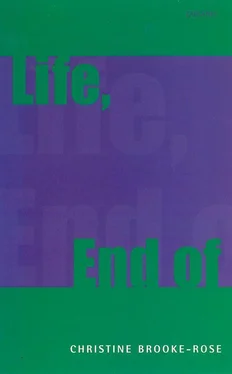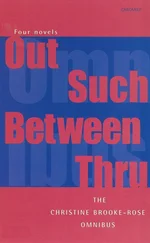Christine Brooke-Rose - Life, End of
Здесь есть возможность читать онлайн «Christine Brooke-Rose - Life, End of» весь текст электронной книги совершенно бесплатно (целиком полную версию без сокращений). В некоторых случаях можно слушать аудио, скачать через торрент в формате fb2 и присутствует краткое содержание. Год выпуска: 2012, ISBN: 2012, Издательство: Carcanet Press Ltd., Жанр: Современная проза, на английском языке. Описание произведения, (предисловие) а так же отзывы посетителей доступны на портале библиотеки ЛибКат.
- Название:Life, End of
- Автор:
- Издательство:Carcanet Press Ltd.
- Жанр:
- Год:2012
- ISBN:9781847775726
- Рейтинг книги:5 / 5. Голосов: 1
-
Избранное:Добавить в избранное
- Отзывы:
-
Ваша оценка:
- 100
- 1
- 2
- 3
- 4
- 5
Life, End of: краткое содержание, описание и аннотация
Предлагаем к чтению аннотацию, описание, краткое содержание или предисловие (зависит от того, что написал сам автор книги «Life, End of»). Если вы не нашли необходимую информацию о книге — напишите в комментариях, мы постараемся отыскать её.
by a master of experimental novels finds the author reflecting on her old age and its effects on her writing. As she reflects on her own career, her experiments with narrative, and on the narrative she writes here, she ultimately reasserts herself and accepts the life behind her.
Life, End of — читать онлайн бесплатно полную книгу (весь текст) целиком
Ниже представлен текст книги, разбитый по страницам. Система сохранения места последней прочитанной страницы, позволяет с удобством читать онлайн бесплатно книгу «Life, End of», без необходимости каждый раз заново искать на чём Вы остановились. Поставьте закладку, и сможете в любой момент перейти на страницу, на которой закончили чтение.
Интервал:
Закладка:
The glaucomous eyes grow squintilly weary of reading all day, the body grows heavier since unable to go out and walk. And despite the passion and ease of understanding, an ease resulting from long training of intake, it all gets nevertheless forgotten. Why not, since no seminars to give no conference papers to prepare, no books to write. On the way to nearby death, what is intake for? Just pleasure. Still, the merely personal unmemorability of such books creates tele-temptations. Documentaries, science programmes, earth reports, political discussions. These last however sooner or later are unhearable since speakers interrupt each other relentlessly until the less loud voice is quelled, though meanwhile listeners lose all. And since each country broadcasts as few learning programmes as possible at comfortable hours, two dishes bring them on a full platter of time-zone choices.
For after all, even these learning programmes are fictions too, in a way. How? Well, in the same way any presenter of anything tells a daily lie by his very presence when he says see you tomorrow. He won’t, but we’ll see him. Or an author is shown typing, on his personal screen, the very novel that is published and being discussed on the screen that shows him. Such frequent staging sunders trust in the supposedly true programmes.
A windy-haired professor walks and talks his way through a wood, down a street, up a rock, or barley-careless into a field, his voice saying, say, it’s a battlefield. Or better, a battlefield called Waterloo, the camera careful not to include the modern pyramidal monument stair-climbed by tourists, yet cutting-room-switches to a crowd of office workers locusting out of the tube-station called, on camera, Waterloo. Another follows the trail of a sixteenth-century conquistador gone native, from Rio Grande to Mexico by trenito or jeep, and stops to talk to locals who have just about heard, because it’s legendary, of the mountain of gold he sought, but not of him. In the organised amnesia of modern schooling is such non-humorous fusion of temporal levels wise?
Levels. Do they still exist? On the global plane, a French colleague writes, in English, translating sur le plan global , unaware even as teacher that most English words still remain closer, imaginatively, to the objects they denote, than most French words. In French global has become equivalent to mondial, which does not mean worldly but world-wide, and can thus be drawn and quartered. But a globe is a globe is a globe. And can’t so easily have planes. Nevertheless it is also losing touch, as abstraction.
Global village, global warming, global warm-ongering.
But globalisation never gives the other side of things. It is a means of control and of new sovereignty.
The office workers pouring out of Waterloo Station fill the screen like an over-population in a globalised impoverished country whose productions have been steadily down-valued by Western traders for fifty years. Presumably in exchange for aid. For without roads, without water, how can they sell their coffee, their cocoa, their cotton? Their meal. Grand plans formed far away keep none of these promises but give money that goes straight into the pockets or Swiss accounts of dictators and other heads of state. In fact new democracies create only mafia-type executives and millionaires.
Here in Europe the Waterloo crowd is a telecliché suggesting a plague of humans, but merely at rush-hour, temporary (provisional), since the people here have 2.2 children, remaining permanently below the reproduction rate. Hence immigration, to replenish, but this must never be said. Whereas in the source countries the swarming crowd shots represent exponential increase, all to die of war famine thirst deadly viruses if they don’t themselves stifle the planet first, not the way we are doing, faster, through luxury goods, but through uncontrolled multiplication. The more you multiply the more you divide, as the Bible does not warn. Tramps once considered picturesque, until they turn into the homeless. The few Rhodes scholars respected, until they turn into immigrants. More strangling still, man as we know him appears some five to ten million years ago. In all that time, he multiplies slowly and wide. By the beginning of the twentieth century, he has multiplied to five billion. On the entire planet. By the end of that same century, he becomes six billion. One fifth of a five billion growth during five million years, now added in one century. True, but misleading, says a True Friend, a demographer. Misleading wraps all truth. He launches into a long and digressive lecture, as detailed as population growth. Why misleading? Roughly, many continents are lowering their birth-rates. Not thanks to Western efforts but through imitation. For women are swiftly/slowly emancipating themselves from patriarchal structures, and want the easier life and riches now seen. But of course capitalism does not make its riches accessible, it merely shows them. Still, it’s an ongoing process. Except for the continent that doesn’t, which is regarded as a failure. Africa. What does that mean? Abandon? The cradle of mankind. The mid-myth of mitochondrial Eve. The beginning of its death. Yet why do we expect them all to do in fifty years what takes several centuries in the West? Why should we regard our flawed democracy as ideal model for all?
And now there’s also a report of a projected nine billion in the next fifty years. Three billion more in half a century. Is that possible? Could it be a journalistic error?
Grain takes a lot of water to cook, and fire, and time, four hours. So refugees on that continent need to burn wood. Seven thousand of them in the 70s, now seven million. More and more arrive. Some remain refugees for ever. It is therefore not a short-term problem.
Failure of a continent. Where man first appeared. Is that the same as old age? The same as all the doctors who, for each ailment and after many tests, say You have X and we can’t do anything. Difficult not to decode as Well at your age why should we bother. And if medical scientists are succeeding in prolonging life, why can’t they at the same time prolong it in a tolerably good condition? Because they’re not doing it for each individual, who doesn’t count except as guinea-pig, but for mankind? Another abstraction. The earth the planet the world can’t feed more than it feeds, whoever they are.
Modern powers, like old monarchies, don’t hear the people till they flood the streets of the whole world like blood in blocked arteries. Can we marginalise three-quarters of the world population and get away with it? Can we imagine the other?
A sneaking suspicion arises: aid is given but in such a way as never to solve anything. Could this shabby treatment be forethought, to kill off tiresome over-populations?
But then, if the globe is quenched and strangled, we don’t survive either. Vast vested interests in fossil fuels cars planes friable tankers over-heating over-air-conditioning and such prevent the few who try from doing anything.
If someone should rewrite history as progress becoming errors, would anyone listen and learn? And would it be too late anyway? Every new notion, sudden invention, impressive progress, new development, forgotten failures, a bubble burst, a hole in the archives, what gets lost, undone, as the old de-words betray: demolition (of high-rise towers that demolished slums), decolonialisation denationalsation deprivatisation dedevelopment deregulation delocalisation decentralisation deindustrialisation, but then, all this is de-scription and de-termination. And earlier, slower, defeodalisation, deposition, decapitation or murder of monarchies and all the rest. Now the de-words are replaced by post-ones, merely disguising the same thing. Perhaps when the upright position of humans is erroneously deconstructed they’ll all be happier nuzzling in the dehydrated and dearborified jungles, or living as pre-eukaryot bacteria in unoxygenated Pre-Cambrian seas over two billion years ago. At that point they still have a mass extinction of life to face, two hundred and fifty-one billion years ago.
Читать дальшеИнтервал:
Закладка:
Похожие книги на «Life, End of»
Представляем Вашему вниманию похожие книги на «Life, End of» списком для выбора. Мы отобрали схожую по названию и смыслу литературу в надежде предоставить читателям больше вариантов отыскать новые, интересные, ещё непрочитанные произведения.
Обсуждение, отзывы о книге «Life, End of» и просто собственные мнения читателей. Оставьте ваши комментарии, напишите, что Вы думаете о произведении, его смысле или главных героях. Укажите что конкретно понравилось, а что нет, и почему Вы так считаете.












